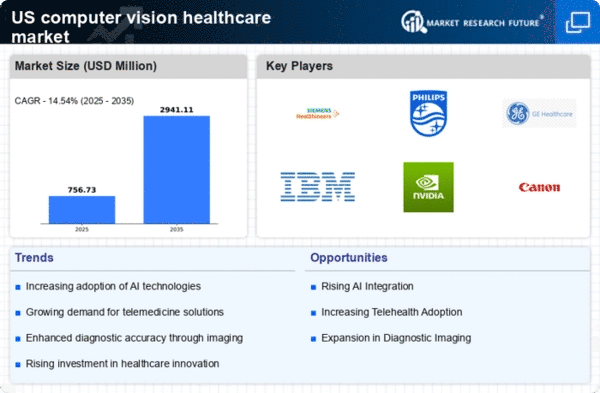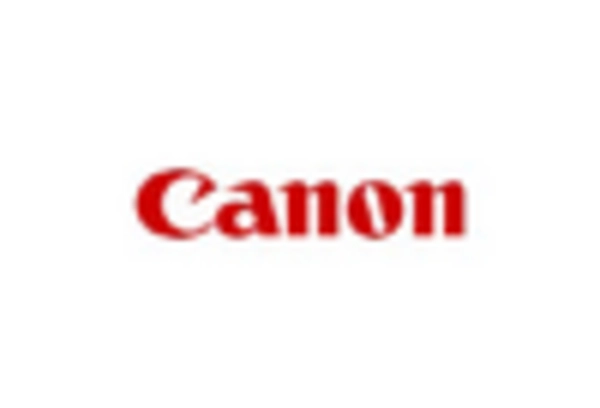Emphasis on Early Disease Detection
The emphasis on early disease detection is a critical factor driving the computer vision-healthcare market. With the increasing recognition of the benefits of early diagnosis, healthcare providers are increasingly adopting computer vision technologies to identify diseases at their nascent stages. This trend is particularly evident in fields such as oncology and cardiology, where timely intervention can significantly improve patient outcomes. The market is projected to grow substantially, with estimates suggesting a compound annual growth rate (CAGR) of 20% over the next five years. As healthcare systems prioritize early detection strategies, the demand for computer vision solutions is expected to rise, further propelling the computer vision-healthcare market.
Growing Focus on Personalized Medicine
The growing focus on personalized medicine is reshaping the landscape of the computer vision-healthcare market. As healthcare shifts towards tailored treatment plans, the role of computer vision technologies in analyzing patient data becomes increasingly critical. By leveraging advanced imaging techniques, healthcare providers can gain insights into individual patient conditions, leading to more effective treatment strategies. The market is anticipated to witness substantial growth, with estimates suggesting a valuation of $3 billion by 2027. This trend indicates a shift towards integrating computer vision solutions into routine clinical practice, thereby enhancing the overall quality of patient care and driving the computer vision-healthcare market forward.
Rising Demand for Efficient Healthcare Solutions
The computer vision-healthcare market is experiencing a notable surge in demand for efficient healthcare solutions. As healthcare providers strive to enhance patient outcomes while managing costs, the integration of computer vision technologies appears to offer a viable pathway. For instance, the market is projected to reach approximately $2 billion by 2026, driven by the need for automation in diagnostic processes. This demand is further fueled by the increasing prevalence of chronic diseases, which necessitates advanced imaging techniques for timely diagnosis. Consequently, healthcare organizations are increasingly investing in computer vision technologies to streamline operations and improve diagnostic accuracy, thereby propelling the growth of the computer vision-healthcare market.
Technological Advancements in Imaging Techniques
Technological advancements in imaging techniques are significantly influencing the computer vision-healthcare market. Innovations such as deep learning algorithms and enhanced image processing capabilities are enabling healthcare professionals to analyze medical images with unprecedented accuracy. For example, the market is expected to grow at a CAGR of around 25% from 2025 to 2030, reflecting the increasing reliance on these advanced imaging solutions. These technologies not only improve diagnostic precision but also reduce the time required for image analysis, which is crucial in emergency medical situations. As a result, the adoption of cutting-edge imaging technologies is likely to drive the expansion of the computer vision-healthcare market.
Increased Investment in Healthcare IT Infrastructure
Increased investment in healthcare IT infrastructure is a pivotal driver for the computer vision-healthcare market. As healthcare organizations recognize the importance of robust IT systems, funding for advanced technologies, including computer vision, is on the rise. Reports indicate that healthcare IT spending is projected to exceed $200 billion by 2025, with a significant portion allocated to imaging and diagnostic technologies. This investment is essential for integrating computer vision solutions into existing healthcare frameworks, facilitating seamless data exchange and improving diagnostic workflows. Consequently, the enhancement of IT infrastructure is likely to bolster the growth of the computer vision-healthcare market.
















